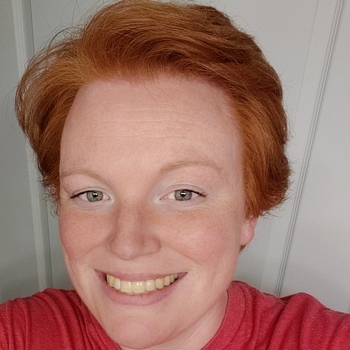
Christina L. Brown
Introduction
Christina is a Licensed Professional Counselor, Registered Art Therapist, and Certified Sex Offender Treatment Provider who has a background in art, psychology, and counseling. At the beginning of her career, Christina practiced in Portsmouth, VA for 3 years at an inpatient residential facility for youth and has been practicing in Chesapeake, VA for the past several years in an outpatient setting. Her experience includes providing case management, individual, family, and group therapy as well as art/play therapy to children/adolescents in a residential setting. Within this setting, Christina provided specialized therapy to youth diagnosed with intellectual disabilities/mood disorders and co-occurring sexually harmful/reactive/addictive behaviors, who were often part of the juvenile justice system and/or foster care system. In 2018, Christina transitioned to private practice and began providing individual/family therapy to children (ages 3-17) and adults (18+), as well as art/play therapy/couples therapy/dream analysis/faith-based counseling to the Hampton Roads community. Christina entered the mental health field in 2009 when she began providing supportive services to young adults and the elderly diagnosed with intellectual disabilities/coexisting disorders. Christina worked in both day support/group home settings from 2009-2013 and assisted individuals with carrying out all activities related to daily living skills, personal hygiene (including toileting), physical/social interactions in the community, and medication management. Christina graduated with an Associate of Applied Arts Degree in Studio Arts from Tidewater Community College Visual Arts Center in Portsmouth in 2013 and a Bachelor of Science degree in Psychology from Regent University in Virginia Beach in 2012. In 2013, Christina decided to combine her passions for art and psychology and was accepted into medical school. In 2015, Christina completed a dual Master of Science Degree in Art Therapy and Counseling from Eastern Virginia Medical School in Norfolk. She completed her clinical training from 2013-2015 at Sentara Obici Hospital’s Psychiatric Unit in Suffolk, Renaissance Academy in Virginia Beach, and Harbor Point Behavioral Health Center in Portsmouth. Christina also spent time volunteering at Eastern Virginia Medical School’s HOPES Clinic where she engaged patients in the process of therapeutic art making and self-reflection. In 2014, Christina travelled to Haiti with fellow EVMS medical students, and provided “art as therapy” services to over 400 children of all ages residing in two orphanages and one village in various parts of the country. In 2021, Christina completed several play therapy workshops with Old Dominion University in Norfolk and presently continues to further her education in play therapy. Christina utilizes a holistic, eclectic approach to tailor therapy to meet her client’s needs and level of comfort. As both a psychotherapist and an art therapist, she employs both traditional counseling ("talk therapy") and play therapy as well as image-making and the creative process to support healing, transformation, wellness, and growth. The therapeutic process is person centered and considers each person’s strengths, life experience, age, gender, culture, heritage, language, beliefs, and identity. Christina has experience and is open to working with clients who also want to include matters of the Christian faith and life into the counseling experience. Therapy may incorporate any of the following approaches, but is not limited to: accelerated resolution therapy (ART), motivational interviewing, positive psychology, cognitive-behavioral (CBT), trauma focused CBT, solution focused, diabolical behavior therapy (DBT), family systems, psychoanalytic, supportive, Jungian, and Adlerian. Christina’s interests include: providing art/play therapy, individual therapy, dream analysis, and faith-based counseling to children, adolescents, and adults. Her specialty areas include working with young children (ages 3-6), the elderly, and adults with intellectual disabilities to address stress, life transitions, sexually harmful/reactive behaviors, trauma, mood disorders, neurodevelopmental disorders, disruptive, impulse-control, and conduct disorders, and elimination disorders.
Highlights
- Accepting new clients
- In-person & telehealth appointments
- Accepts online payments and insurance
Licenses
-
LPC #0701007459 (VA)
-
ATR #17-319 (VA)
-
CSOTP #0812000793 (VA)
Specialties
Additional focus areas
Treatment Approaches
Population focus
Appointment types
- Individuals
- Couples
Communities
-
People with Disabilities
-
Military/Veterans
Age groups
-
Toddlers (under 6)
-
Children (6-12)
-
Teenagers (12-18)
-
Young Adults (18-24)
-
Adults (24+)
-
Elders (65+)
Languages
-
English
Faiths
-
Atheist
-
Christian
-
Catholic
-
Agnostic
-
Jewish
-
Pagan
-
Interfaith
-
Jehovah's Witnesses
-
Multi-Faith
-
Latter-day Saints/Mormon
Pay with insurance
-
Aetna
-
Anthem
-
Cigna
-
United Healthcare
-
TRICARE East
-
Optum
Pay out-of-pocket
-
Intake/Initial Appointment $195
-
Emotional/Behavioral Assessment Form $8
-
Individual Session (30 minutes) $100
-
Individual Session (45 minutes) $125
-
Individual Session (60 minutes) $150
-
Family Therapy $150
-
Interactive Complexity of Care $25
-
Non-sufficient funds (NSF) $30
-
Documentation $50
-
Cancellation (under 24 hrs notice) $100
-
No Show $100
-
Charge Backs $30